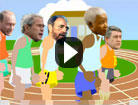I’ve been working with the UK’s National Health Service recently and have noticed the welcome emergence of Evidence-Based Medicine as a better way of reaching decisions than doctors relying on habit, their own relatively narrow experience, hierarchy (“I’m the consultant, therefore my decisions must not be questioned”), and the mystique of their own expertise.
Bob Sutton and Jeffrey Pfeffer have a new book out, partly inspired by Evidence-Based Medicine. In their book, Hard Facts, Dangerous Half Truths and Total Nonsense , they draw on the growth of Evidence-Based Medicine as a discipline and call for a parallel growth in evidence-based business decision-making instead of instinct.
BUT, I’m not so sure. Intuition and instinct are not always based on “Dangerous Half Truths and Total Nonsense” as the title of their book says. They are actually often sub-conscious, fast ways of processing, accessing and aggregating evidence and then reaching a swift conclusion.
Leaders need more of both – a clear-eyed focus on the relevant facts and evidence (rather than evidence that promotes a particular agenda or perspective), PLUS more reliance on individual and collective instinct.
I’ve got a couple of great examples of the power of instinct somewhere. I’ll dig them out and post them. One’s to do with finding fish, the other with how George Soros’ gets a back spasm when he’s about to make a ‘wrong’ investment decision.









Leave a Reply